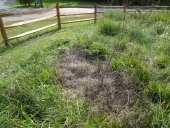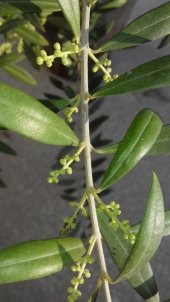




Medicinal herbs, kitchen herbs, perennial edibles and berries: https://mountainherbs.net/ grown in the Blue Mountains, Australia




The ultimate goal of farming is not the growing of crops, but the cultivation and perfection of human beings. - Masanobu Fukuoka
 1
1








Medicinal herbs, kitchen herbs, perennial edibles and berries: https://mountainherbs.net/ grown in the Blue Mountains, Australia




Living in Anjou , France,
For the many not for the few
http://www.permies.com/t/80/31583/projects/Permie-Pennies-France#330873










Medicinal herbs, kitchen herbs, perennial edibles and berries: https://mountainherbs.net/ grown in the Blue Mountains, Australia




Angelika Maier wrote:I read some reviews at amazon and the original press does not seem to be of a great quality either. It seems to me very small. A bit like grinding flour with a corona mill. Building home scaled oil presses would really be a nice income for permies.










Living in Anjou , France,
For the many not for the few
http://www.permies.com/t/80/31583/projects/Permie-Pennies-France#330873
 1
1










 1
1








Living in Anjou , France,
For the many not for the few
http://www.permies.com/t/80/31583/projects/Permie-Pennies-France#330873








Medicinal herbs, kitchen herbs, perennial edibles and berries: https://mountainherbs.net/ grown in the Blue Mountains, Australia
 5
5




Angelika Maier wrote:
The problem here is mainly how to process oil on a household scale. We do not have any oil presses near us.
Destruction precedes creation
 5
5




Our inability to change everything should not stop us from changing what we can.
 7
7




Blazing trails in disabled homesteading
 3
3




 1
1




Invasive plants are Earth's way of insisting we notice her medicines. Stephen Herrod Buhner
Everyone learns what works by learning what doesn't work. Stephen Herrod Buhner

 4
4








Ellen
Music, Farming, Community! How do I choose? Oh wait, I choose all three.....
 1
1




Anne Miller wrote:My choice would be sunflowers. I have read a lot of folks use sunflower seed oil in cooking.
Blazing trails in disabled homesteading




Fats used in frying emit cooking oil fumes. These fumes contain toxic substances called aldehydes that may increase one's risk of cancer. Deep frying produces the most aldehydes, but sunflower oil generates more aldehydes than other oils regardless of the cooking method. Experts recommend low-heat cooking methods when using sunflower oil. Aldehydes have also been found in fried food and in the oil after frying.
Invasive plants are Earth's way of insisting we notice her medicines. Stephen Herrod Buhner
Everyone learns what works by learning what doesn't work. Stephen Herrod Buhner




Anne Miller wrote:So I ask Mr. Google:
Fats used in frying emit cooking oil fumes. These fumes contain toxic substances called aldehydes that may increase one's risk of cancer. Deep frying produces the most aldehydes, but sunflower oil generates more aldehydes than other oils regardless of the cooking method. Experts recommend low-heat cooking methods when using sunflower oil. Aldehydes have also been found in fried food and in the oil after frying.
Blazing trails in disabled homesteading
 2
2




Anne Miller wrote:If sunflower oil is bad for you why are there so many YouTubers and folks talking about making their own oil with it?
Blazing trails in disabled homesteading
 5
5











 4
4




William Bronson wrote:Canola oil in the USA is usually made from genetically modified plants and processed with chemicals.
Rapeseed oil, in the European union is made from non-gmo rapeseed, bred for low levels of Erucic Acid.
Mustard oil is canola oil made from plants with high levels of Erucic Acid.
Are any of them good for you?
Oil is a concentrated source of fat calories that huge swaths of humanity depend on.
When we are forced to supply it ourselves, we must accept the limitations of our immediate surroundings.
Sunflowers produce oilseed in one season, and can thrive under rather poor circumstances.
I think that is the main reason they are preferred by homesteaders.
My idea choice for oil here in zone 6 is a grove of dwarf chinkapin oaks.
I would sell most of what I produced, store coconut oil for hard times and eat lard on the daily.
If there was a collapse my tools for and experience in making oil and meal from acorns would be very useful.
Yes another project to pursue!

|
Natural gas heat uses 20 tons out of 30. This tiny ad is carbon neutral.
Free Seed Starting Webinar Weds Feb 4, 3PM PST / 6PM EST
https://ortakitchengarden.com/pages/permies-seed-class-landing
|




